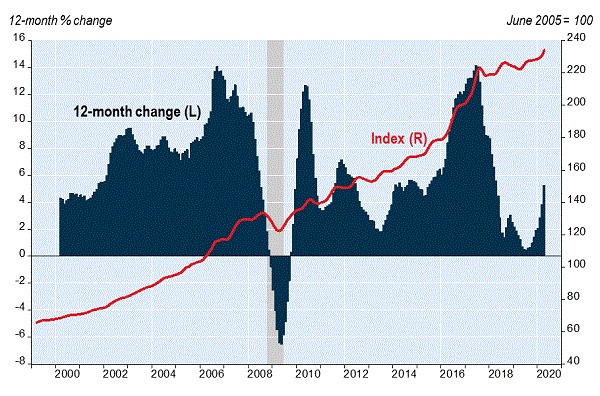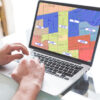

May 20, 2020
In April the Teranet–National Bank National Composite House Price IndexTM was up 1.3% from the previous month. As in February and March, that was double the average gain of the last 10 Aprils. Leading the countrywide average rise were the metropolitan markets of Ottawa-Gatineau (2.4%), Toronto (2.0%), Halifax (1.8%), Montreal (1.7%), Victoria (1.2%), Hamilton (1.1%) and Winnipeg (0.9%). Matching it was Vancouver at 0.6%. Trailing it were Quebec City (0.3%), Calgary (0.2%) and Edmonton (flat on the month).
The index for Vancouver has now gone seven months without a decline, confirming a turnaround of the trend of the previous 14 straight months without a rise. The index for Ottawa-Gatineau has risen in 12 of the last 13 months, those for Hamilton, Toronto and Montreal in 11. Over a longer term, Montreal stands out with 35 gains in the last 40 months, trailed distantly by Toronto and Hamilton with 26 and Ottawa-Gatineau with 25. It is true, however, that the last three markets have risen slightly more than Montreal over those 40 months.

In April the composite index was up 5.3% from a year earlier, for a ninth consecutive acceleration of the 12-month gain to its strongest since May 2018. The 12-month rise was led by Ottawa-Gatineau (13.2%), Montreal (9.5%), Halifax (9.5%), Hamilton (8.9%) and Toronto (8.2%). Lagging the countrywide average were Victoria (4.6%), Winnipeg (3.2%) and Vancouver (0.4%). The Quebec City index was flat from a year earlier, having fluctuated without tendency over the 12 months. Deflating over the 12 months were Calgary (−0.8%) and Edmonton (−2.8%).
Besides the Toronto and Hamilton indexes included in the composite index, indexes exist for the seven other urban areas of the Golden Horseshoe. In April, all of them were up from the previous month and from a year earlier: Peterborough 3.2%, Barrie 5.4%, Guelph 7.7%, Oshawa 7.8%, Brantford 8.3%, St. Catharines 10.7%, Kitchener 11.4%.
Indexes not included in the composite index also exist for seven markets outside the Golden Horseshoe. Of the two in B.C., Abbotsford-Mission was up 3.5% and Kelowna 5.0%. Of the five in Ontario, Thunder Bay has declined in the last eight months and by April was down 6.0% from a year earlier. The other four were all up from a year earlier – Sudbury 5.8%, Windsor 12.0%, London 9.9% and Kingston 9.8%.
Among the 11 Indexes included in the composite index and the 14 other indexes available, April showed the fewest monthly declines (two out of 25) since last June. This could obviously change with the economy now thrown into recession by the public-health measures taken to contain the spread of the Covid-19 virus.
For the full report, including historical data, please visit www.housepriceindex.ca.







